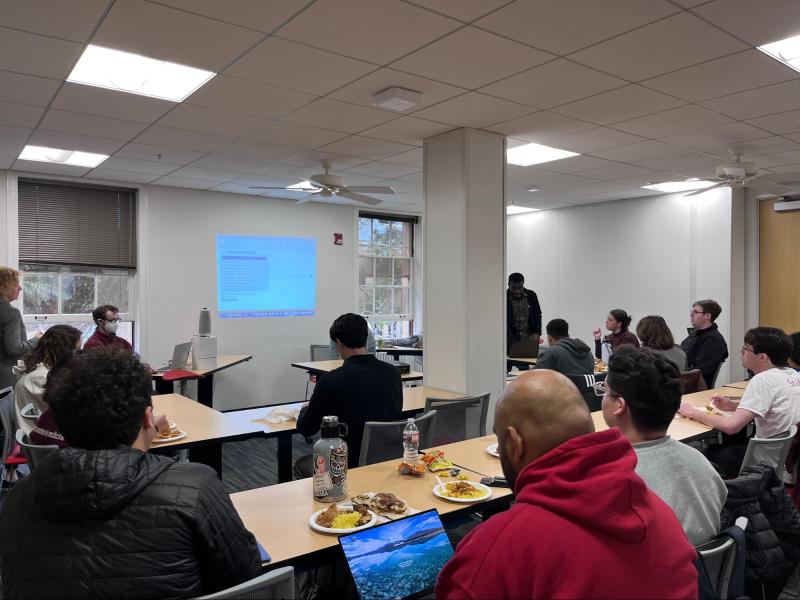Student members of the Committee of 12 (C12) proposed Honor Code-related recommendations, including research into proctoring exams and potential restructuring of the judicial process, to members of the Undergraduate Senate (UGS) and Graduate Student Council (GSC) in a student stakeholder meeting on Thursday. The meeting occurred shortly after the C12 publicly released its proposals and recommendations on the judicial charter and process, Honor Code and interpretations of the fundamental standard the same day.
C12 student co-chair Jamie Fine, a sixth-year Ph.D. student in Modern Thought and Literature, presented the C12’s recommendations, which proposed overhauling much of the current Honor Code. The suggested changes were an effort to make the Honor Code more clear-cut and emphasize community responsibility, according to Fine.
“The goal here was to keep it still pretty succinct and we’ve added some definitions to it,” Fine said. “But we wanted to emphasize the idea that the Honor Code is not on students — it’s on our community. This is about all of us.”
Diego Kagurabadza ’25, UGS Parliamentarian and member of the UGS Committee on the Board of Judicial Affairs (BJA) and C12, said that he supported the shift in the language of the Honor Code to a focus on upholding academic integrity, rather than “honor.”
“I appreciate that the proposed language changes to the Honor Code frame it as something about academic integrity, as opposed to honor, which may convey something a little more negative about a student’s personal qualities,” Kagurabadza said.
The C12 proposal did not include explicit changes to the Honor Code regarding a divisive topic among students: proctoring of examinations.
The current Honor Code prohibits instructors from remaining in an examination room while students are testing. Instructors and teaching assistants (TAs) are permitted to be in the room at the start of the session to explain the exam, inconsistently throughout the test’s duration to provide clarification and at the exam’s conclusion to collect test papers.
Instead of explicitly changing this policy, the C12 has laid out a research-based approach, proposing the formation of an Academic Integrity Working Group (AIWG) to “carry out a multi-year study… of equitable in-person proctoring practices.”
The AIWG would consist of 10 members — four students, four instructors, one member of the Office of Community Standards (OCS) and one member of the Office of General Counsel (OGC). The group would begin its research during the 2023-2024 academic school year, and the research would last for two to four years.
According to Fine, C12 members aren’t making specific recommendations on proctoring in part due to the need for more research on the impact of proctoring.
“While we recognized that we have ideas [on proctoring], what we wanted was a group that is going to be professional,” Fine said. “So we are relying on this AIWG to provide the kinds of [research] questions that we think need to be answered based on our reporting and the outreach that we have done so far.”
Some students expressed concerns that the C12 proposals didn’t address whether the plan to establish the AIWG would allow student stakeholder groups to provide their insights on the policies ultimately proposed by the AIWG.
“Because there’s no other language in the Honor Code on what’s after [this study], it’s like an open terrain. I think it’s important to include here that decisions or findings from this study will be reviewed,” UGS Co-Chair Amira Dehmani ’24 said. If the research group were to suggest proctoring to be advantageous, “adding proctoring to classrooms is a very big decision that deserves the same scrutiny that we’ve been giving [these recommendations].”
The C12 also proposed suggestions that would restructure the flow of the judicial process for charging Honor Code violations.
Fine said that the current judicial process has a “linearity” that was “very concerning.” According to Fine, every reported Honor Code violation undergoes the same investigative and panel process, with similar degrees of imposed sanctions, without considering the student situation — like their class year and whether or not they have a history of charged Honor Code violations.
As a result, the C12 proposed a judicial process with three tiers of review: Alternative Resolution, Mid-Level Review and High-Level Review, for the least-severe to most-severe reported violations.
The Alternative Resolution would involve a Restorative Meeting, giving students the chance to work with academic coaches based on how well the student understands the severity of their violation in order to manage potential future cases. These academic coaches would not know that the student violated the Honor Code to avoid any biases — intentional or not — in their interactions.
“[For instance, if a student] didn’t understand the difference between using ChatGPT and using online resources, they would work with somebody to talk through that,” Fine said.
Moving forward, Kagurabadza said that he is anticipating more discussion among UGS and GSC members, along with the Stanford student population, about the recommendations. He said he also expects more negotiations with the C12 about how many of the recommendations will be passed at once.
Kagurabadza said that he looks forward to collaborating further with other senators to provide more feedback to the C12. He said he also wants to get community input on the proposals.
“I certainly want to ask our constituents what they think,” Kagurabadza said.
A previous version of this article misidentified Amira Dehmani’s class year. The Daily regrets this error.
